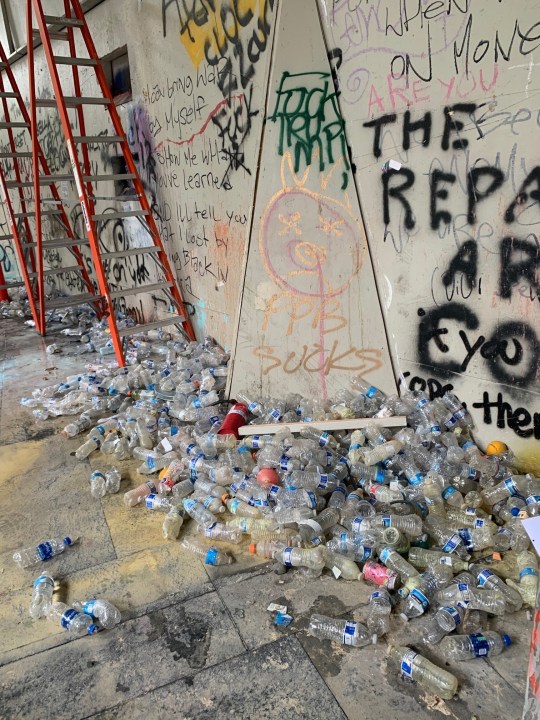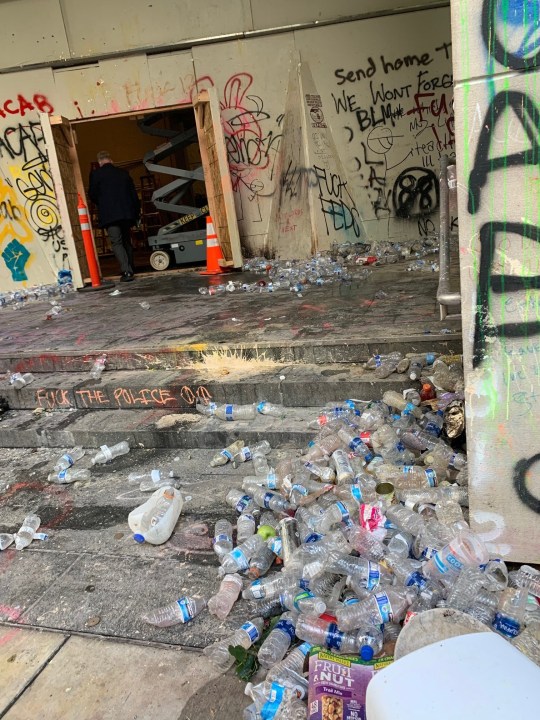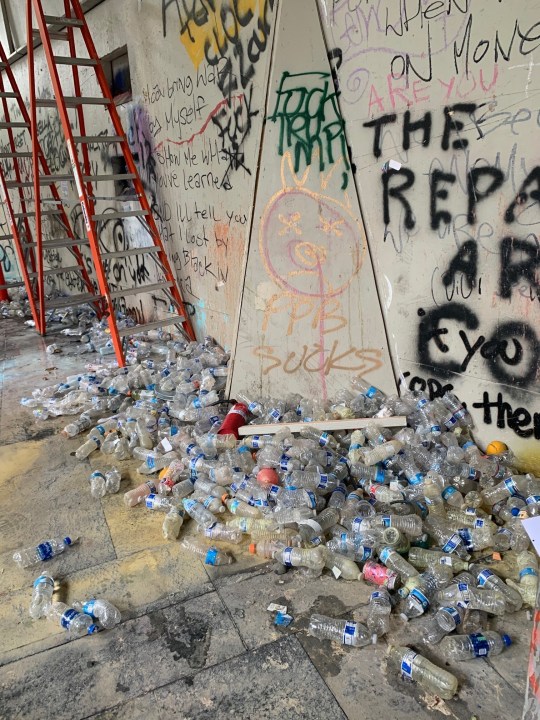PORTLAND, Ore. (AP/KOIN) — Eighteen people have been arrested this week in Portland, Oregon, on federal charges while protesting the presence of federal law enforcement agents, the state’s top U.S. prosecutor said Friday.
The number of arrests doesn’t include those made early Friday, when federal agents again used tear gas against demonstrators.
The charges involving the protests include assaulting federal officers, arson and damaging federal property, U.S. Attorney for Oregon Billy J. Williams said. All the defendants are local, and they were released pending trial after making a court appearance.
Those charged with failure to comply with a lawful order are: Joseph Lagalo, 37; Baily Dreibelbis, 22; Nicholas Kloiber, 26; David Hazan, 24; Hailey Holden, 30; Marnie Sager, 27; Ella Miller, 26; Caleb Ehlers, 23; Paul Furst, 22; and Cameron Knuetson, age unknown. Those charged with assault of a federal officer are: Jennifer Kristiansen, 37; Taylor Lemons, 31; Giovanni Bondurant, 19; Gabriel Houston, 22. Twenty-four-year-old Jerusalem Callahan was charged with damaging federal property, while Wyatt Ash-Milby, 21, was charged with trespassing on federal property. Joseph Ybarra, 21, was charged with arson, and 45-year-old Zachary Duffly was charged with creating a disturbance.
Acting DHS Secretary Chad Wolf previously said there had been 43 federal arrests as of Tuesday.
The news of additional arrests came hours after a federal judge late Thursday blocked U.S. agents from arresting or using physical force against journalists and legal observers at protests in Oregon’s largest city, where President Donald Trump is testing the limits of federal power.
Meanwhile, agents with the Federal Bureau of Investigation’s Portland office confirmed they’re investigating violence at the protests.
“The FBI’s role is to investigate violent crime and hold those accountable who are engaging in violent acts or significant destruction of property,” a spokesperson said in a statement, adding, “Our focus is not on membership in particular groups but on individuals who commit violence and criminal activity that constitutes a federal crime or poses a threat to national security.”
Federal agents used tear gas early Friday to force thousands of demonstrators from crowding around a U.S. courthouse.
Protesters had projected lasers on the building and attempted to take down a security fence that had been reinforced to keep demonstrators at a distance. The protesters moved away as clouds of gas rose from the area and flash grenades could be heard.
U.S. Judge Michael Simon made his ruling about media and observers a day after Portland’s mayor was tear-gassed by federal agents while making an appearance outside the courthouse during raucous demonstrations. Protests have been kept up in the city for nearly two months since the police killing of George Floyd in Minneapolis.
Simon had previously ruled that journalists and legal observers are exempt from police orders requiring protesters to disperse once an unlawful assembly has been declared. U.S. lawyers intervened, saying journalists should have to leave when ordered.
“This order is a victory for the rule of law,” said Jann Carson, ACLU of Oregon’s interim executive director.
The judge said objections by law enforcement were outweighed by First Amendment concerns.
“None of the government’s proffered interests outweigh the public’s interest in accurate and timely information about how law enforcement is treating” protesters, he wrote.
Simon’s order is in effect for 14 days. Journalists and observers must wear clear identification, he said. A freelance photographer covering the protests for The Associated Press submitted an affidavit that he was beaten with batons and hit with chemical irritants and rubber bullets this week.
The ACLU lawsuit is one of several filed in response to law enforcement actions during the protests. The state of Oregon is seeking an order limiting federal agents’ arrest powers during the demonstrations.
The Justice Department’s inspector general said Thursday it will review the conduct of federal agents who responded to unrest in Portland and in Washington after concerns emerged from members of Congress and the public.
On Wednesday, Mayor Ted Wheeler, a Democrat, and hundreds of others were objecting to the presence of federal police sent by Trump, who labeled the demonstrators as “agitators & anarchists” after Wheeler was gassed.
It wasn’t immediately clear if the agents knew that Wheeler was in the crowd when they used the tear gas.
Wheeler has opposed the federal agents’ presence but has also faced harsh criticism from the protesters, who yelled and swore at him.
Earlier in the night, Wheeler was mostly jeered by protesters as he tried to rally the demonstrators who have clashed nightly with federal agents. But they briefly applauded when he shouted “Black Lives Matter” and pumped his fist in the air.
City council members accused Wheeler of not reining in police who used tear gas multiple times on protesters before federal agents arrived. And city business leaders have condemned the mayor for not bringing the situation under control before the agents showed up.
Wheeler did not participate in lighting any of the fires or attempting to tear down the fence and was surrounded by his security team when he was gassed.
Wheeler’s appearance in the protest zone came hours after state attorneys for Oregon urged another judge to issue a restraining order against the federal agents. Oregon Attorney General Ellen Rosenblum’s lawsuit accuses federal agents of arresting protesters without probable cause, whisking them away in unmarked cars and using excessive force. Federal authorities have disputed those allegations.
The hearing in U.S. District Judge Michael Mosman’s court focused on the actions of the more than 100 federal agents responding to protests outside the Portland courthouse.
The state’s motion asks Mosman to command agents from the Department of Homeland Security, Customs and Border Protection, Federal Protective Service and U.S. Marshals Service to immediately stop detaining protesters without probable cause, to identify themselves and their agency before arresting anyone, and to explain why an arrest is taking place.


